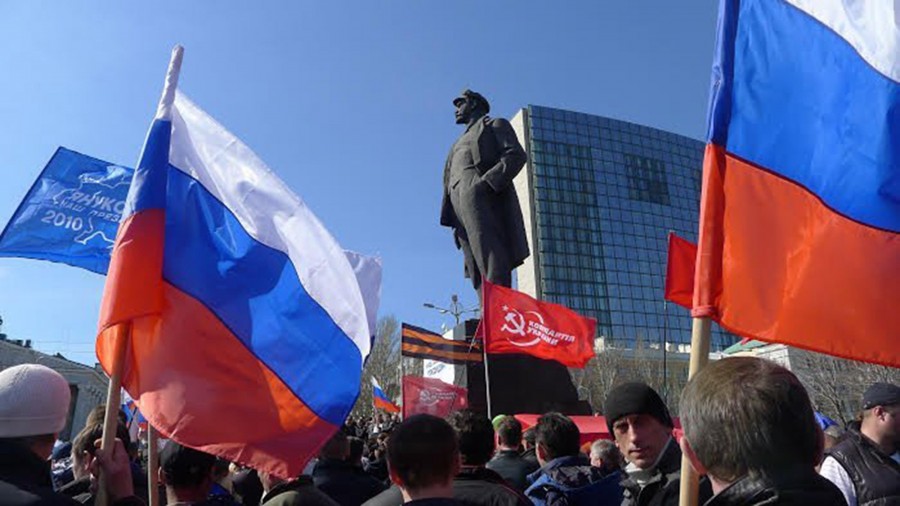Ukraine crisis sparks fears of new Cold War
Roy Gutman
Russia’s annexation of Crimea, made official on Friday, has not ended agitation for closer ties to Russia in other parts of Ukraine. On Saturday, March 22, 2014, about 5,000 people staged a rally in Donetsk, a major city in east Ukraine, to advocate closer ties for the region with Russia, and not the European Union. Gathering beneath a statue of Vladimir Lenin, founder of Soviet Russia, with many carrying communist era flags, they chanted ” Russia,” “Referendum” and “Yanokovych,” a reference to Ukrainian President Viktor Yanukovych, who fled the country last month. (Roy Gutman/MCT)
June 17, 2014
by Dorial Castellanos
Since Russia’s annexation of Crimea on March 21, many have pondered whether the conflict could turn into another Cold War. However, students interviewed by The Student Voice said they weren’t aware of the conflict and don’t really know what the Cold War was or what a new one would be like.
A cold war is a state of political hostility between countries characterized more by “threats and propaganda than actual warfare,” social studies teacher Hans Winberg said.
“If America is going to play its cards, it needs to play them carefully,” Winberg said. “President Obama can’t tolerate that behavior from Russia, but he doesn’t want to use force.”
The U.S. and Europe don’t recognize the annexation of Crimea by Russia, which has installed 6,000 airborne and ground troops in the area. The U.S. and its allies have debated whether to bolster defenses in Europe and have enacted sanctions, economic penalties for disobeying the rules, against wealthy Russians who they believe are collectively responsible for actions that “undermine or threaten the territorial integrity, sovereignty and independence of Ukraine,” according to cnn.com.
President Obama said that the Russia-Ukraine crisis “is not another cold war we are entering,” as reported by CNBC on March 26.
President Vladimir Putin ordered Russian troops near the Ukrainian border back to base on May 19, according to the Kremlin.
Russia is pulling back most of its troops from the Ukrainian border, but a portion of the Russian force “looks like it intends to remain,” said U.S. Air Force General Philip Breedlove, the top commander in Europe for the North Atlantic Treaty Organization, June 4.
While Russia has managed to avoid all-out war so far, the conflict remains potentially dangerous.
“Although Russia has managed to consolidate control of Crimea without provoking a full-blown war with Ukraine, the crisis is by no means over,” according to Edward W. Walker, political science professor at University of California, Berkeley, in the Huffington Post.
The U.S. has reason to avoid war with Russia. According to the Washington Post, Russia still has the largest nuclear arsenal in the world.
“It’s true that Russia was once the West’s greatest geopolitical foe, and it’s still seen that way by many,” as reported by Adam Taylor in the Washington Post.
English teacher Steven Gavrielatos said that Russia’s nuclear arsenal is a potential danger.
“Russia is making a mistake in its quest for power and land,” Gavrielatos said. “If the U.S. gets involved, the issue might escalate.”
Many riots in Ukraine have occurred as a result of Russia’s move. Winberg said that rioters, mostly pro-Russian separatists, are probably “paid zealots,” who support the annexation of Crimea by Russia. “Putin is most likely in control of these riots,” he said.
The possibility of a new cold war with Russia means that America could go back to living under the threat of a nuclear strike, but sophomore Andy Rodriguez said Russia is “all talk and no action.”
“Russia might make threats, but they won’t carry them out,” Rodriguez said. “A nuclear missile strike would mean an all-out World War III.”
Social studies teacher Aldo Grullon said that if the crisis escalates it would be “another cold war we don’t need.”
“If Russia threatens any country with a nuclear missile strike, they have to be taken more seriously, since they do have the largest nuclear arsenal on the planet,” Grullon said. “The U.S. is diplomatically right to get involved to try to attempt to end this peacefully.”
